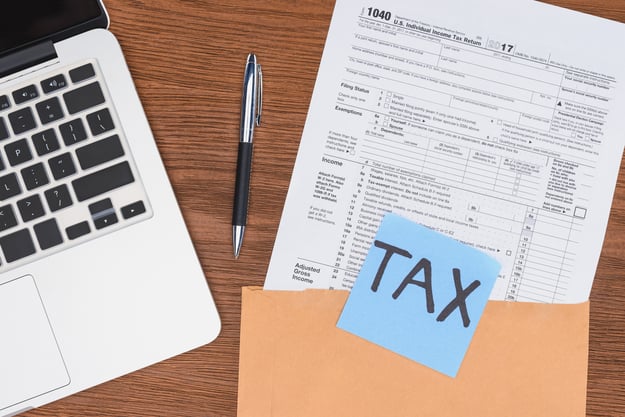
Though we’re nonetheless a few months away, the April 15th tax deadline shall be right here earlier than you realize it, and in case you already owe earnings taxes for earlier tax years, you may be going through a fair bigger tax debt when the mud settles.
The IRS is a infamous creditor and, in case you determine to bury your head within the sand, the IRS will begin garnishing wages, seizing financial institution accounts, and begin inserting liens on your house and different private property. Nonetheless, you continue to produce other choices. Chapter is a superb instrument that can assist you reduce your present tax debt and this weblog will discover how chapter may help you eliminate a few of that undesirable tax debt.
Totally different Sorts of Tax Debt
First, you must start to know the several types of tax debt and the way they’re labeled pursuant to the Chapter Code.
I. Secured Tax Debt
In case you’ve incurred substantial tax debt and have did not pay these taxes prior to now, the IRS has the power to file a tax lien in opposition to an individual’s private and actual property. As soon as the IRS recordsdata this tax lien, the tax debt turns into secured by the property you personal. Nevertheless, this tax lien is simply secured to the extent there’s fairness in an individual’s private or actual property. For instance, you might be at the moment financing a car that’s price $10,000 and you continue to owe the finance firm $5,000. Right here, the car would have an fairness of $5,000 (worth of car minus any liens) which the IRS can connect a lien to.
II. Precedence Tax Debt
These are taxes that you simply owe from the earlier three (3) tax years which have come due. As of the date of this weblog, this refers to tax debt owed for the tax years of 2018, 2019, and 2020 (2021 doesn’t change into a part of this calculation as a result of 2021 taxes will not be due till April 15, 2021). If we’re previous the April 15th deadline, the “precedence tax years” could be 2021, 2020, 2019. In a Chapter 7 chapter, this “precedence tax debt” is non-dischargeable, and the debtor shall be liable to pay these taxes after the chapter case is over. In a Chapter 13, the debtor should pay these taxes by means of a Chapter 13 Plan.
III. Normal Unsecured Tax Debt
Unsecured tax debt is tax debt that’s neither secured nor precedence tax debt as defined above. If an individual can meet the necessities outlined within the subsequent section, these taxes are dischargeable in a Chapter 7 chapter. Nevertheless, in a Chapter 13 chapter, the debtor might need to pay again a small share of the final unsecured tax debt.
Eliminating Tax Debt in a Chapter 7 Chapter
In a Chapter 7 chapter, common unsecured tax debt may be discharged if the next necessities are met:
1. The tax debt have to be from earnings taxes
Taxes have to be from earnings earned. Different kinds of taxes corresponding to gross sales and use tax, payroll taxes, and so on. or are thought of non-dischargeable taxes that can not be eradicated by means of a chapter.
2. The debtor has not dedicated tax fraud or willful evasion of taxes
In case you have been discovered responsible of tax fraud for falsifying info in your tax returns, or have willfully evaded paying earnings taxes, taxes can’t be eradicated by means of a chapter.
3. The tax debt have to be no less than 3 years outdated
Let’s say that you simply file your 2015 earnings taxes on time (earlier than April 15, 2016) and you find yourself owing the IRS $10,000 for the tax 12 months of 2015. The next 12 months, you file your 2016 earnings taxes (earlier than April 15, 2017) and you find yourself owing the IRS a further $10,000 for the tax 12 months of 2016. Lastly, the next 12 months, you file your 2017 earnings taxes (earlier than April 15, 2018) and also you owe the IRS a further $10,000. Now you owe the IRS $30,000 for the tax years of 2015 by means of 2017. You enter into an settlement with the IRS to pay again these taxes, however as you proceed to file your taxes each subsequent 12 months, your tax debt continues to extend, and now the tax debt has change into insurmountable. That is the place the submitting of a chapter may help.
In accordance with Chapter Code Sec. 507(a)(8)(A)(i), following the state of affairs above, if this explicit particular person filed for chapter in the present day, they usually have filed taxes all of their taxes on a time, they’d be eligible to eradicate the tax debt from 2015 by means of 2017 (assuming that the taxes aren’t secured by private or actual property and haven’t been audited by the IRS at any level). That’s $30,000 of tax debt that might presumably be discharged by means of chapter.
To ensure that earnings taxes to change into dischargeable in a chapter, the Debtor should meet the next guidelines:
4. The debtor should meet the “2-Yr Rule”
In accordance with Chapter Code Sec. 523(a)(1)(b)(ii), you possibly can discharge tax debt as long as the tax returns are filed no less than two years earlier than the submitting of a chapter. Even in case you filed your taxes late, you possibly can nonetheless discharge tax debt as long as there’s a two-year hole between the submitting of the taxes and the submitting of the chapter.
5. The debtor should meet the 240-Day Rule
The earnings tax debt will need to have been assessed by the IRS no less than 240 days earlier than the submitting of the chapter.
To place all of it collectively – if 1) you’ve gotten filed your entire taxes on time from 2015 by means of 2017; 2) your taxes have been assessed by the IRS on or across the time that the taxes have been filed; 3) you haven’t dedicated tax fraud or willful evasion of taxes; and 4) these taxes stem from earnings taxes – you can be eligible to discharge any common unsecured tax debt related to these tax years. That is helpful for anybody who’s at the moment carrying a heavy tax burden which will increase each tax 12 months.
Chapter 13 Compensation Plan and Therapy of Taxes
A Chapter 13 chapter permits people with common earnings to formulate a compensation plan whereby the Debtor proposes to pay all or a portion of their money owed in a interval of three to 5 years. As I mentioned beforehand, Precedence Tax Debt and Secured Tax Debt have to be paid again in full by means of a Chapter 13 compensation plan. Nevertheless, you’ll solely pay again the Secured Tax Debt to the extent that this tax debt is secured by non-exempt fairness in any actual or private property.
We Can Assist
Owing taxes shouldn’t be a scary factor – it occurs to most of us and can occur to you at one level in your life. Owing taxes isn’t the tip of the world and all it takes is educating your self about your choices. Whether or not it’s essential to i) utterly eradicate your tax debt by means of Chapter 7 chapter; ii) formulate a compensation plan in a Chapter 13; or iii) in case you’re contemplating chapter and aren’t positive in case your tax liabilities are dischargeable, please contact me immediately so I can consider your particular person case. We’re properly certified as a full-service chapter legislation agency for folks on this county and different New Jersey counties: Passaic County, Hudson County, Essex County, Bergen County, Morris County, and Sussex County. Name us in the present day at 973-870-0434 or toll free 888-412-5091.

